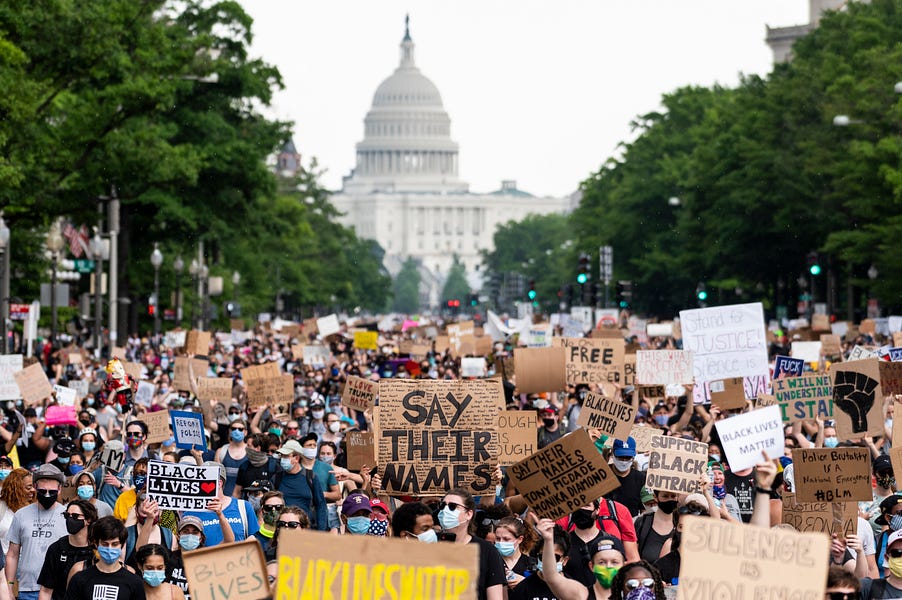Last week I wrote a bit on how the reaction to the death of George Floyd seemed different from past incidents of encounters between black men and law enforcement that went horribly wrong. It felt like the outrage and frustration was more universal, that we weren’t just falling into the trap of criminal-justice reform vs. law and order.
While I do think that those general sentiments are true, that there is overwhelming support for George Floyd’s family and broader attempts by white Americans to be empathetic rather than go on the defensive, the violence that has ensued has become just another event that highlights our differences and our polarization. And in the wake of everything else that divides us, it’s worrying.
We’re three months into a pandemic that has killed more than 100,000 Americans and put tens of millions of people out of work. The initial outpouring of support for health care workers and sympathy for the unemployed has given way to protests of the lockdown and virtue signaling over staying at home. People who worry about the economic crisis are mocked as selfish for “just wanting haircuts.” And some people see simple requests—like wearing a mask—as an affront to their freedom.
The same fractures are happening now in regards to these protests. Instead of having a normal debate over what amount of police and National Guard presence are sufficient to keep demonstrations peaceful and keep people safe, we have the president holding a press conference to threaten widespread military deployment and staging a photo-op that required the clearing of a peaceful protest. And, on the other side, we have woke staffers at the New York Times protesting the publication of an op-ed by Sen. Tom Cotton by staging virtual walkouts and calling the piece “fascist.”
Instead of having a rational discussion about the risks of crowded protests in the midst of a pandemic that has had us largely locked down for nearly three months, we have epidemiologists speaking out vociferously in favor of them while paying lip service to the health risks.
Even as we do manage to have fruitful conversations about how to decrease and eliminate police brutality, with smart points about police unions protecting bad apples and politicians proposing an end to qualified immunity, we have cops on video beating peaceful protesters, elderly men, and members of the media.
America has been at its best when it has come together in response to threats to our democracy and our society. But we typically do that best when the threats are external, as with World War II and 9/11. When the crisis is internal, we struggle more, as with the original battle for civil rights or the protests over the Vietnam War.
“Greatness” has been a mantra for the last four years, between Trump’s pledge to “Make America great again” and some on the left arguing that America was never great. Wherever you fall along that spectrum, it’s undeniable that we can’t really think of ourselves as great until we learn to see crises as a time to come together and not as an opportunity to exploit our divisions.
On that cheery note, here’s the best of what we published this week.
The protests—and riots, and looting—that spread throughout the country over the last two weeks have many Americans recalling the riots that broke out during the tumultuous summer of 1968. Back then, Ben’s Chili Bowl was already a D.C. institution. The restaurant weathered the violence just fine, but the surrounding neighborhood suffered. Declan Garvey talked to Virginia Ali, who founded the restaurant with her husband, Ben, in 1958. “Businesses did not reopen,” she told him. “The middle class began to move away. And then after that, heroin moved in, and then crack cocaine moved in, and we became a ghetto. And that lasted, as I said, 20 years.” History might be repeating itself, and it has Ali at once frustrated and hopeful: “It’s unfortunate that we’ve had to go at this over and over and over again. … But I think now we have more people supporting this cause not only in Washington, but all over this country and all over the world.”
On May 29, four days after George Floyd died, prosecutors charged Derek Chauvin, the Minneapolis police officer who kneeled on Floyd’s neck for almost nine minutes, with third-degree murder and second-degree manslaughter. Law professor Ted Sampsell-Jones explains the differences between those laws, which date back to British common law, and also cautions that—even with the disturbing video evidence—a conviction might not be easy. Sampsell-Jones followed up with another piece after Minnesota Attorney General Keith Ellison added a second-degree murder charge.
The day started out peacefully when Nancy French attended a demonstration in Nashville with two of her children. It was a family event, with local and state politicians addressing the crowd and people letting them speak. (Photos also show at least some social distancing and a considerable number of masks.) But things turned violent at the march that followed the rally. The most upsetting thing for French? Much of the violence was carried out by white protesters. After a white man smeared horse excrement (really!) on a police car, a black marcher admonished him. “He explained that black people couldn’t act that way without getting punished,” French writes. “Also, he said that people would see the damage to the police cars and blame blacks. ‘I couldn’t do that s—t,’ he said, pointing out their privilege.”
In his Friday G-File, Jonah gets a lot of frustration off his chest. He calls out the epidemiologists who are cheering the protests, pointing out that they are undermining their own credibility. And he gets at a point few others, if any, have made. There was plenty of outrage over Wisconsin proceeding with its election in the middle of a pandemic. But now that people are protesting, some of the very same outrage-mongers have a strikingly different attitude: Hey, it’s a free country. That sends the wrong message. “But here we have experts and elected politicians telling us that the marching is more important than the voting, that expressing cathartic rage is more important than the basic functions of the democracy that populism is supposed to make healthier.” His verdict? “Bovine excrement.” He also analyzes the reaction from Trump supporters to a statement from Gen. James Mattis that was critical of Trump.
Now, here’s the best of the rest of our stuff:
-
David French wrote about the military and its role in the protests twice this week. In his first members-only newsletter of the week, he explained how it would be a failure if the Floyd protests devolved to the point of needing the military, but also that the military has evolved and is now more trusted and better trained than law enforcement. In his second, he warns about the dangers of, as he puts it, “using the military to trigger the libs.”
-
The more we learn about coronavirus, the more we learn that it’s less likely to be transmitted outdoors. But we’re about to find out for sure, as protests around the country are taking place without much social distancing or mask-wearing. Andrew Egger investigates.
-
On Thursday night, the Dispatch Podcast gang—Sarah, Jonah, David, and Steve—did a live Zoom event for members. If you missed it, check it out here. (This link is for paid members only.)
-
Last but not least, the pods: On the Dispatch Podcast, the gang talked about the protests, Steve King’s primary loss, and journalism ethics. On Advisory Opinions, David and Sarah touched on Mattis’ sharp critique of President Trump and Defense Secretary Mark Esper’s break with the president over using the military to quell the protests. And on The Remnant? Jonah and historian Vincent Cannato lament the Chinese curse about “living in interesting times.”
Photograph by Bill Clark/CQ-Roll Call/Getty Images.








Please note that we at The Dispatch hold ourselves, our work, and our commenters to a higher standard than other places on the internet. We welcome comments that foster genuine debate or discussion—including comments critical of us or our work—but responses that include ad hominem attacks on fellow Dispatch members or are intended to stoke fear and anger may be moderated.
You are currently using a limited time guest pass and do not have access to commenting. Consider subscribing to join the conversation.
With your membership, you only have the ability to comment on The Morning Dispatch articles. Consider upgrading to join the conversation everywhere.